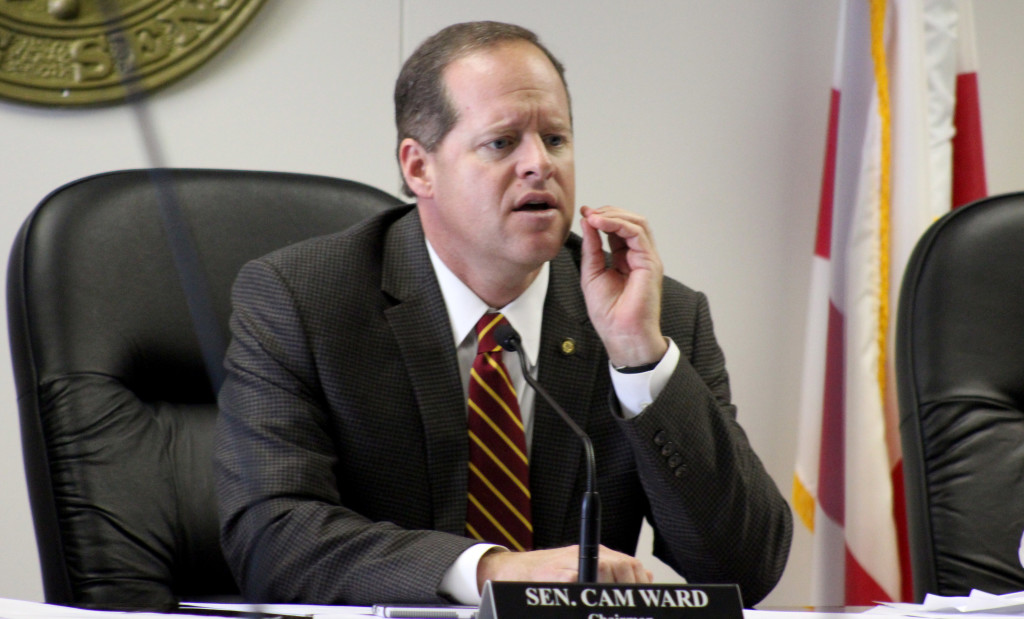Cam Ward introduces bill to increase penalties for human trafficking

An Alabama state senator introduced a bill on Tuesday to enhance the criminal penalties for obstructing the enforcement of the human trafficking laws in Alabama. Alabaster-Republican State Sen. Cam Ward introduced SB179, which was cosponsored by Tom Whatley (R-Auburn) and Gerald Dial (R-Lineville). According to the Federal Bureau of Investigation (FBI), human trafficking is believed to be the third-largest criminal activity in the world. “It is a form of human slavery which must be addressed at the interagency level. Human trafficking includes forced labor, domestic servitude, and commercial sex trafficking.” “This awful crime preys predominately on children,” Ward tweeted of the bill on Wednesday. While many Alabamians are unaware of its ongoings, sex trafficking is actively happening not only abroad, but also in Alabama. According to the National Human Trafficking Hotline at least 36 human trafficking cases were reported in the Yellowhammer State in 2017. They also report more than 111 victims of human trafficking in Alabama have called its hotline for help this year. In fact, the stretch of I-20 between Atlanta and Birmingham is known as the Sex Trafficking Superhighway. “It cuts right there through downtown Birmingham, and what we’re finding, unfortunately with the interstate system that you and I use to get from Birmingham to Montgomery — is that people are using it to bring in girls, for example, for a short period of time. Buyers are available, and then they leave,” David Pinkleton, fundraising chair for the Alabama Human Trafficking Task Force told CBS 42 last year. Under existing law, human trafficking is a crime. Additionally, obstruction of the enforcement of the laws criminalizing human trafficking is a crime. Under the proposed law, a person commits the crime of human trafficking in the first degree if: He or she knowingly subjects another person to labor servitude or sexual servitude through use of coercion or deception. He or she knowingly obtains, recruits, entices, solicits, induces, threatens, isolates, harbors, holds, restrains, transports, provides, or maintains any minor for the purpose of causing a minor to engage in sexual servitude. For purposes of this section, it is not required that the defendant have knowledge of a minor victim’s age, nor is reasonable mistake of age a defense to liability under this section. A corporation, or any other legal entity other than an individual, may be prosecuted for human trafficking in the first degree for an act or omission only if an agent of the corporation or entity performs the conduct which is an element of the crime while acting within the scope of his or her office or employment and on behalf of the corporation or entity, and the commission of the crime was either authorized, requested, commanded, performed, or within the scope of the person’s employment on behalf of the corporation or entity or constituted a pattern of conduct that an agent of the corporation or entity knew or should have known was occurring. Any person who obstructs, or attempts to obstruct, or in any way interferes with or prevents the enforcement of this section shall be guilty of a Class A felony. Human trafficking in the first degree would be a Class A felony. Under the bill if a person commits the crime of human trafficking in the second degree if: A person knowingly benefits, financially or by receiving anything of value, from participation in a venture or engagement for the purpose of sexual servitude or labor servitude. A person knowingly recruits, entices, solicits, induces, harbors, transports, holds, restrains, provides, maintains, subjects, or obtains by any means another person for the purpose of labor servitude or sexual servitude. A corporation, or any other legal entity other than an individual, may be prosecuted for human trafficking in the second degree for an act or omission only if an agent of the corporation or entity performs the conduct which is an element of the crime while acting within the scope of his or her office or employment and on behalf of the corporation or entity, and the commission of the crime was either authorized, requested, commanded, performed, or within the scope of the person’s employment on behalf of the corporation or entity or constituted a pattern of conduct that an agent of the corporation or entity knew or should have known was occurring. Any person who obstructs, or attempts to obstruct, or in any way interferes with or prevents the enforcement of this section shall be guilty of a Class B felony. Rainbow City-Republican State Representative Mack Butler is expected to sponsor a similar bill in the House.
Kay Ivey, Cam Ward to hold press conference on Alabama Juvenile Justice Task Force

State officials will hold a press conference on Wednesday to discuss the current state of the juvenile justice system and how it can be improved through data-driven, fiscally-sound legislation with inter-branch, bipartisan support. Governor Kay Ivey, Alabaster-Republican State Sen. Cam Ward, Chief Justice Lyn Stuart, Moody-Republican State Rep. Jim Hill (R), and Mobile-Democrat State Sen. Vivian Figures will discuss the efforts of the Alabama Juvenile Justice Task Force, which issued a set of recommendations last month for consideration during the 2018 legislative session. According to a news release from the Governor’s office, this legislation will accomplish four goals: Promote public safety and hold juvenile offenders accountable. Control taxpayer costs. Improve outcomes for youth, families, and communities in Alabama. The press conference will take place in the Capitol Auditorium Wednesday, January 10 at 10 a.m. CT.
Cam Ward and Matt Fridy: A positive note in prison debate

The news surrounding the Alabama corrections system seems to be one negative story after another with much of the focus on the need for reform and consolidation in the system as well as higher quality of service and better outcomes. Much of this is true and is a result of inadequate funding, not because of poor leadership or management. In fact, we would argue that ADOC has some of the best leadership under Commissioner Jeff Dunn and his team that we have had in some time. They are tackling the bigger problems and looking for ways to solve them in the face of many challenges. However, not everything at ADOC is bad news, in fact there is one diamond among the rough that Dunn and his team have recognized as an example of how corrections could be run with the appropriate funding and dedication to positive outcomes for those leaving the system and returning to their local communities. The Alabama Therapeutic Education Facility in Columbiana, Ala. will have been open for ten years this coming March and have worked with almost 7,000 ADOC inmates who participated in an innovative six month rehabilitation program at the facility. The program is a partnership between the GEO Group as well as ADOC and the Alabama Department of Post Secondary Education. Here the participants come from DOC facilities all over the state and enter into a six month evidence based program of drug rehabilitation, education and an opportunity for a vocational degree in five different trades and crafts via our community college system. We have toured the ATEF and it is in fact a model of what we as legislators would like to see across the state of Alabama. Why? What are the results from almost ten years at this unique medium security facility? According to the Alabama Department of Corrections this past July, over those ten years, the ATEF has an average recidivism rate of 15%. To put that into context, the state of Alabama’s recidivism rate is 35% (per ADOC) and the national average is 76%. In fact, a U.S. Bureau of Justice study stated that within five years of release, 76% of inmates leaving state facilities are rearrested. The challenge we have in Alabama and will continue to have, is adequate funding for proven programs such as ATEF. However, with a commitment from the Ivey Administration, the ADOC, ALDPSE and the legislature, the teaching and the treatment and the vocational degrees for participants going back to their local communities can continue and will at ATEF. Alabama should be looking for ways to fully utilize ATEF and expand this model with proven results into other areas of our state’s corrections system. Simply put, the results speak for themselves and if we dedicate funding to expanding a program with a 15% recidivism rate, numerous lives will be improved and the state will see the benefits for decades to come. ••• Cam Ward is a Republican member of the Alabama Senate. He has represented District 14 since 2010. Matt Fridy is a Republican member of the Alabama House. He has represented District 73 since 2014.
State Sen. Cam Ward elected chair of national energy research group

Alabaster-Republican, state Sen. Cam Ward has been elected the new chairman for the Center for Legislative Energy and Environmental Research (CLEER) for 2017-2018. Ward was installed at the group’s annual meeting Little Rock, Ark. on Sunday. CLEER is an affiliate of the multi-state Energy Council — consisting of twelve energy producing states and two Canadian provinces with the purpose of monitoring and influencing energy policy. CLEER meetings are held quarterly in conjunction with the Energy Council meetings “I am honored to be selected chairman of such a distinguished research group. Along with my CLEER colleagues from across the country, I will continue to promote an energy and environmental policy that strengthens the United States’ position as the world’s leader in the delivery of electricity, natural gas, and energy resources,” said Ward in a statement. “I want to thank New Mexico State Sen. Carroll Leavell for the tremendous job he’s done as the past chairman of CLEER.”
Judge: Psychiatric care unconstitutional in Alabama prisons

Alabama’s psychiatric care of state inmates is “horrendously inadequate” and violates the U.S. Constitution’s ban on cruel and unusual punishment, a federal judge ruled Tuesday. U.S. District Judge Myron Thompson ruled in favor of all current and future Alabama inmates with serious mental health problems. “Given the severity and urgency of the need for mental-health care explained in this opinion, the proposed relief must be both immediate and long term,” Thompson wrote in the 302-page decision. Gov. Kay Ivey said she would work closely with Corrections Commissioner Jefferson Dunn and state legislative leaders to address the issues raised in the ruling. “I am committed to providing justice to all Alabamians by ensuring constitutionally-permissible conditions for all prisoners,” the governor said. Lawyers for inmates say they were reviewing the decision and would comment later. “I can’t say this comes as a surprise to anybody. Some of us have been saying for years that this was coming,” said state Sen. Cam Ward, who has spearheaded prison reform efforts as well as unsuccessful legislation to build new prisons. “We as a legislative body are going to deal with the financial consequences,” Ward said. The mental health claims were part of a larger inmate lawsuit filed in 2014 over medical care. The judge presided over a trial that began in December focusing on mental health, and last month, he certified this part as a class action on behalf of all current and future inmates with serious mental illness. State officials denied providing inadequate mental health treatment, but the judge cited evidence to the contrary from inmates and prison officials. One inmate killed himself days after testifying, prompting the state to agree to new suicide prevention methods while the trial continued. The judge acknowledged that the department blames lack of funding, but he said money alone couldn’t make up for such poor treatment, and sweeping change is required. Alabama’s troubled state prison system houses nearly twice the inmates it was designed for. Prison officers and inmates have been killed and injured in a series of violent crimes behind bars. The litigation echoes lawsuits in states, including California, South Carolina and Arizona, that led to court orders and settlement agreements to improve conditions or reduce crowding. Republished with permission of The Associated Press.
State forms inter-branch, bipartisan Alabama Juvenile Justice Task Force

Alabama’s juvenile justice system may soon see some improvements following a comprehensive review by a group of legislators, judges, law enforcement officials and others. Gov. Kay Ivey‘s office announced the formation of an inter-branch, bipartisan Juvenile Justice Task Force on Tuesday. The 22 member group has been charged with performing a comprehensive, data-driven review of Alabama’s juvenile justice system and coming to consensus on policy recommendations that protect public safety, hold youth accountable, control costs, and improve outcomes for youth, families and communities. “I am committed to improving public safety outcomes from our state’s juvenile justice system,” said Ivey. “This Task Force will build on what is working well in our state and improve what is not.” Formed by Ivey, Chief Justice Lyn Stuart, Senate President Pro Tempore Del Marsh, and Speaker of the House Mac McCutcheon, the Task Force will conduct its assessment of the state’s system by reviewing data from the courts and state agencies, collecting input from stakeholders from across the state, considering strategies tested in other states, and examining how the Alabama system can better align with research about what works best to improve juvenile justice outcomes. “Alabama does many things right in juvenile justice already,” said Chief Justice Stuart. “However, there is more to be done, and I have faith that the Task Force will come together to carefully review what works in juvenile justice and develop solutions that will keep Alabama communities safe and put youth on the right track.” They group will submit a report of their findings and recommendations to state leadership in December with findings and recommendations for consideration during the 2018 legislative session. “Our Task Force is charged with finding ways Alabama can improve our efforts to protect public safety by preventing juvenile crime,” explained Ward. “Working together, we can make sure our state is getting the best return on Alabama taxpayer dollars by focusing our system on strategies that achieve better results for youth, families, and communities.” McCutcheon says the task force will help bring Alabama “into the next chapter of how our state serves its most troubled youth.” “The Task Force is committed to developing data-driven options to help put these youth on a path to productive citizenship,” added McCutcheon. The membership of the Task Force includes: Judge Bob Bailey, 15th Judicial Circuit Daryl Bailey, District Attorney, Montgomery County Gar Blume, Blume & Blume Attorneys at Law, PC Sonny Brasfield, Association of County Commissions of Alabama Christy Cain, Executive Director, Alabama Children First Derrick Cunningham, Sheriff, Montgomery County Senator Vivian Davis Figures, District 33 Representative Jim Hill, District 50 Governor Kay Ivey, or designee Judge Adrian Johnson, 2nd Judicial Circuit Representative Mike Jones, District 92 Steven Lafreniere, Director, Department of Youth Services Jim Loop, Deputy Director, Department of Human Resources Speaker Mac McCutcheon, House of Representatives, or designee Senate President Pro Tempore Del Marsh, or designee Cary McMillan, Director, Family Court Division, Administrative Office of Courts Jim Perdue, Commissioner, Department of Mental Health Lyn Stuart, Chief Justice, Alabama Supreme Court Senator Cam Ward, District 14 Kay Atchinson Warfield, Department of Education The Task Force will receive technical assistance from The Pew Charitable Trusts.
House approves legislation to streamline death penalty appeals

The Alabama House of Representatives on Tuesday approved a bill that would streamline the appeals process for death row inmates. SB187, the Fair Justice Act, streamlines the appeals process by requiring inmates to raise claims such as ineffective counsel at the same time as direct appeal claiming trial errors. It was approved by the House 74-26. The bill’s sponsor, Alabaster-Republican Sen. Cam Ward says the bill should drop the appeals time from roughly 18 years down to nine. However, many House Democrats argue it increases the chances the state could execute an innocent person. Attorney General Steve Marshall disagrees. He thinks the bill is the solution to the state’s inefficient appeals process. “There is no doubt that Alabama’s system for reviewing capital cases is inefficient and in need of repair,” said Marshall. “The average death row inmate appeal time is over 15 years and rising. Each year that these appeals drag on, the general public is further removed from and even desensitized to the horrendous crimes that led to the sentences of every individual on death row. But, for the families of victims, the pain is not numbed with the passing of years. The endless appeals process reopens their wounds again and again.” Marshall continued, “This legislation is about justice, and justice should be fair and swift. The Fair Justice Act takes nothing away from a death row inmate in terms of the courts reviewing his case, but streamlines the appellate process so that the direct appeal and the state post-conviction stage occur simultaneously.” The Fair Justice Act passed the Alabama Senate on April 18. It will return to the Senate for concurrence or conference committee.
Alabama Senate approves plan to build up to three new prisons

The Alabama Senate on Thursday approved a state prison construction plan, taking significant steps to solve the long-standing crisis in Alabama’s prisons. After nearly three hours of debate, Senators voted 23-11 for Senate Bill 302, which authorizes a $350 million state bond issue to build one new prison and renovate others. Gov. Robert Bentley, a strong advocate for prison reform, calls the vote a “step in the right direction” even though it differs from his original proposal of $800 million. “Today Alabama took a step in the right direction to solve a decades old problem facing the Alabama Department of Corrections,” said Bentley in a news release. “I commend the Alabama Senate for their work on the passage of the Prison Transformation Initiative.” He continued, “I understand this bill is a work in progress and my ultimate goal remains the same, and that is to have safe and modern facilities that solve the persistent overcrowding of our prisons that will protect our law enforcement officers and inmates, as well prepare the inmates to successfully transition back into our communities. If we are to truly transform the person, we must first transform the system. As this legislation moves to the House, I look forward to working with House members to pass the Alabama Prison Transformation Initiative.” Currently, Alabama’s prisons house far more inmates than originally intended, with the prisons at over 170% of capacity. The proposal passed Thursday, sponsored by Alabaster-Republican state Senator Cam Ward authorizes the Department of Corrections to enter lease agreements with counties to finance and construct the facilities, and establishes clear criteria for how Corrections will award the lease agreements. As the second-largest expenditure in the state’s General Fund, the budget for all non-education state spending, the prison system is a significant and persistent fiscal strain on the state. For the current fiscal year, Corrections alone costs the state $496 million and consumes 22% of the General Fund budget. “The state prison system is close to exploding the state budget,” said Ward. “We have numerous prisons that were built before the Vietnam War and some pre-date World War Two. The upkeep alone for these facilities is a bleeding hole in our budgets.” “This plan will dramatically increase safety for our inmates and our correctional officers,” Ward added. “There have been too many instances over the past year of officers being assaulted and, in some cases, killed. The dormitory-style of housing at some of our prisons is particularly dangerous. Modern, cell-block facilities with high-tech cameras and better lines-of-sight will save lives.” Senate Bill 302 now moves to the Alabama House of Representatives for consideration.
Steve Flowers: Bringing Alabama sales tax into 21st-century

My tradition for over two decades has been to give my children money for Christmas. Under this system, there is no returning of items. They get what they want or need. There is no way that I would know what style of clothing, color or size they like. It works well. The most illuminating thing that occurred to me this year is that both of my daughters and my granddaughter bought all their Christmas gifts from me online. Without question, our country and state have changed dramatically technologically in my lifetime. Therefore, Alabama and other states have to change the way that sales tax is collected. States have to find a solution and the will to derive sales tax from online purchases. The legislature has wisely set up a budget reform task force to study, evaluate and come forward with long-term solutions to problems and loopholes in the law like online sales tax. The committee is headed by two stellar legislators, Sen. Clyde Chambliss (R-Prattville) and Rep. Danny Garrett (R-Trussville). This blue-ribbon panel will review and develop recommendations as to how Alabama can adjust to 21st-century budgeting. This non-collection of sales tax on online purchases is a serious problem and it perfectly illustrates how our tax system is more designed for the 20th century than the 21st. We, like many other states, are not keeping up with the technology shifts in the world. Legislators unquestionably have to re-evaluate the state’s tax structure to reflect the new online and digital economy. Rep. Garrett has wisely acknowledged, “We used to tax about two-thirds of the economy with the sales tax. Today, we tax one-third of our economy.” He further observed, “We are leaning very heavily on the income tax, and our sales tax base is eroding due to online sales.” Another issue, which will be discussed during this legislative session, is the deterioration of our transportation system in the state. This problem is not unique to Alabama. In fact, President Trump made this a hallmark issue of his campaign last year. Most Washington political observers fully expect to see a massive infrastructure package passed in a bipartisan manner early in Trump’s administration. Alabama needs to be poised to take advantage of this bonanza. The last major federal highway initiative came in the 1950s during the administration of Ike Eisenhower. It was also passed with bipartisan support. According to recent studies, 15 percent of Alabama roads and highways are in poor condition and 35 percent more are rated as fair, with 25 percent of our bridges deemed obsolete. The legislature may need to look at increasing the gas tax to take advantage of this federal windfall. More than likely, a state tax contribution will be needed to match the federal dollars. Alabama’s gas tax has not been increased since 1990. We have Richard Shelby, but he may need some help. The new Speaker of the House, Mac McCutcheon is from the Huntsville/Madison County area. The Rocket City is Alabama’s crown jewel economically. They realize the importance that adequate progressive highways are to sustained growth and prosperity. McCutcheon spearheaded the effort to increase the revenue for roads and bridges last year. About a dozen states raised the gas tax in 2016 to keep up with inflation and growth. Our neighboring state of Florida was one of them. Speaking of McCutcheon, he is adjusting well to his new role a Speaker. He is fair and even handed. His selection of Rep. Alan Boothe to be his Rules Chairman seems to be meshing well. The House leadership has changed even more dramatically since the session began. The Republican caucus has elected Rep. Nathaniel Ledbetter of Rainsville as their new Majority Leader. Ledbetter is a freshman House member and former mayor of Rainsville. Rep. Connie Rowe of Jasper will serve as Vice-Chairwoman of the Caucus. She is the first female to hold the position. Ledbetter replaces former Majority Leader Mickey Hammond of Decatur. Sen. Cam Ward has become the good shepherd, chief cook and bottle washer of the prison construction project. He has scaled back the size and scope of the original proposal. The legislature is trying to stay ahead of the federal courts on addressing the state’s prison overcrowding problem. See you next week. ___ Steve Flowers is Alabama’s leading political columnist. His weekly column appears in over 60 Alabama newspapers. He served 16 years in the state Legislature. Steve may be reached at www.steveflowers.us.
Steve Flowers: Alabama political stories that flew under the radar in 2016

While the presidential race played out this year, several things happened in Alabama politics that went under the radar. First, a federal appeals court upheld the legislature’s banning PAC to PAC transfers. The new Republican legislative majority that marched into the Statehouse in 2011 set out to destroy and bury the last bastion of Democratic power in the state – the once omnipotent Alabama Education Association. They succeeded. One of the legs they sawed off was the PAC to PAC money laundering scheme that AEA so adroitly used to funnel and hide their campaign contributions. The primary beneficiary of the AEA transfer was to Joe Reed’s Alabama Democratic Conference. The three-judge panel’s ruling does not limit the amount of money that the ADC can raise, it just disallows the AEA from transferring money to their sister organization. The AEA/ADC coalition was not the only group using this PAC to PAC shell game of hiding campaign contributions. The practice was pervasive. However, the ADC was the one that sued to say that the PAC to PAC prohibition was unconstitutional because it banned free speech and due process. Attorney General Luther Strange praised the ruling saying “the PAC to PAC transfer ban has been instrumental in limiting campaign corruption while adding greater transparency to the election process.” This federal court ruling has hammered an additional final nail in the coffin of the once vaunted AEA. In early October, the U.S. Justice Department launched a statewide investigation into the safety and sanitary conditions of Alabama’s men’s prisons. It has been common knowledge that Alabama’s prisons are overcrowded. It is probably a foregone conclusion that there is a very real possibility that the federal courts may intervene and take over control of our prisons. The state already settled a suit with the Department of Justice over problems with the Julia Tutwiler women’s prison in Wetumpka arising out of allegations of physical and sexual violence. This settlement occurred about a year ago. The Justice Department is now saying that the same problems exist in the men’s prisons. The DOJ investigation may very well be the precursor to federal intervention. The prison problem will have to be front and center when the legislature convenes in February. State Senator Cam Ward of Shelby County, who chairs the Senate Judiciary Committee and has been at the forefront of the prison issue, says, “At the end of the day you have to change the facilities to some degree not just for the safety of inmates but for the safety of those who work there.” Alabama’s prisons were at 178 percent capacity in July. This severe overcrowding is the primary contributing factor to violence in prisons. There have been six homicides at the St. Clair Correctional facility between 2011 and 2014. There have been riots at Holman prison in Atmore. The Bibb and Bessemer correctional facilities have seen numerous allegations of physical and sexual abuse. All three U.S. Attorneys in the State have tacitly agreed with the Justice Department investigation. The Governor’s Advisory Council on gambling is meeting and will formulate a plan of action to propose to the legislature when they convene in February. This seven-member advisory panel will examine the entire gambling gambit. Hopefully, this council will promulgate a plan of action for gambling in Alabama. This issue of gambling has plagued the state for decades. In fact, it has existed since the state’s founding. Gambling revenue is probably the state’s largest potential revenue source. Our state is losing millions of dollars to our surrounding states. Hopefully, this council will look at all aspects of gambling including the lottery, how to extract some money from the Poarch Creek Indian casino monopoly, and also allowing the locally sanctioned facilities in Greene, Macon and Lowndes counties to exist and pay some state taxes. The council should have a recommendation to give the legislature by Jan. 31, 2017, in time for the legislative session in February. The race for our open U.S. Senate seat is beginning to percolate. Candidates will be wise to avoid the interim appointment to the seat by Gov. Robert Bentley. The early favorites to win election to the seat are Attorney General Luther Strange and Congressman Robert Aderholt. A host of viable candidates will enter the fray. See you next week. ••• Steve Flowers is Alabama’s leading political columnist. His weekly column appears in over 60 Alabama newspapers. He served 16 years in the state Legislature. Steve may be reached at www.steveflowers.us.
Alabama legislative preview: May 3 — May 4, 2016

Two days. That’s all Alabama’s state lawmakers have to complete their legislative priorities for the year. Some bills will end up languishing in the annals of Alabama history, while others will get their day on the governor’s desk. The entire session has been covered in the grey cloud of scandal, between accusations of Gov. Robert Bentley‘s infidelity, and the impending ethics trial of Speaker Mike Hubbard, but legislators stayed on track … mostly. Some much-debated bills like the gas tax are dead for good this year, while others, like payday lending reform and industrial hemp legalization, are walking a blade-thin line to final passage. Here is what legislators have on their plate for the final two days of the 2016 Regular Session. Here is what legislators have on their plate for the final two days of the 2016 Regular Session. House — Convenes Tuesday at 1 p.m. SB372 creates a new provision in Alabama’s controversial “chemical endangerment of a child” law, allowing the consumption of controlled substances under the “good faith” supervision of a physician. The chemical endangerment law came under fire last fall after a searing investigation by AL.com and ProPublica. Sponsored by Sen. Clyde Chambliss (R-Montgomery) in the Senate and Rep. April Weaver (R-Alabaster) in the House. SB91 regulates Payday Lenders, restricting the interest rates and fees they may charge. The bill being considered in the House Tuesday is a watered-down version of one passed by the Senate in early April. Should it pass the House it would have to be reconsidered by the Senate in the waning hours of the Session on Wednesday. Sponsored by Sen. Arthur Orr (R-Decatur) in the Senate and Rep. Danny Garrett (R-Trussville) in the House. SB268 Currently, an inmate’s eligibility for Medicaid is terminated once they are incarcerated. SB268, already passed by the Senate, would change that termination to a suspension. The bill’s sponsors argue this will help reformed convicts land back on their feet when their sentences are complete. Sponsored by Sen. Cam Ward (R-Alabaster) in the Senate and Rep. Chris England (D-Tuscaloosa) in the House. SB347 which would give the Department of Agriculture and Industries the authority to study, regulate, and tax industrial hemp, and reclassify the plant as separate from marijuana. Similar bills have been passed previously in both the House and Senate, but because they weren’t identical they must be considered again. Sponsored by Sen. Paul Bussman (R-Cullman) in the Senate, and Rep. Ken Johnson (R-Moulton) in the House. Senate — Convenes Tuesday at 1 p.m. HB204 reorders the names appearing on primary ballots in presidential election years to present elected official positions first, and delegates to the national convention last. Currently, the delegates come directly after the presidential candidates themselves, an arrangement found to be confusing for many primary voters, as they had to sift through a litany of names they didn’t recognize to find the candidates for federal and state offices. Sponsored by Rep. Randy Wood (R-Saks) HB393 is the House version of the industrial hemp bill described above. HB433 prohibits a sexually exploited child from being “adjudicated, delinquent or convicted of a crime of prostitution.” Essentially, the bill protects children who are victims of sexual crimes or trafficking from being convicted of prostitution. The bill’s sponsor is a longtime advocate for harsher penalties for sex traffickers, and has fought to protect the victims of the deplorable practice. Sponsored by Rep. Jack Williams (R-Vestavia Hills) HB98 allows qualifying retirees from the U.S. Military to obtain concealed weapons permits from their county’s sheriff at no cost to them. The Sheriff may revoke the permit if cause is found. Sponsored by Rep. David Standridge (R-Hayden)
State bureaucrats killed anti-earmarking bill, says sponsor Cam Ward

When Sen. Cam Ward proposed an anti-earmarking bill, it made sense to the many fiscal hawks in conservative-dominated Montgomery. Alabama sets aside 91 percent of its General Fund revenue for predetermined purposes, the highest percentage in the nation and some four times the average. That can make it difficult to weather fiscal storms, leading to indiscriminate across-the-board cuts to state services — already less well-funded than even many of the state’s Deep South neighbors — when times are lean, and puts no pressure on state agencies to justify their spending, since they know last year’s appropriations are the automatic baseline for this year’s. So Ward introduced SB15, which would have “un-earmarked” some 15 percent of the state’s spoken-for funding, amounting to around $450 in the 2016 budget and presumably rising over time. Ward says such a move giving lawmakers more flexibility to set priorities and adjust to fluctuations in revenue, which can vary widely. The bill also contained provisions intended to keep intact state dollars which draw down federal funding, creating a multiplier effect in revenue which most consider sacred. It also softened the potential blow to services by leaving unchanged funding for critical services. But the bill died early on in the 2016 Legislative Session. The culprit, according to Ward? Those state agencies who draw down federal dollars and provide critical services, among others. Veterans groups publicly opposed the bill, after which supporters somewhat scaled back their plans to overhaul the way the statehouse budgets. But behind the scenes, Ward told Alabama Today, a cavalcade of other state government interests also blocked the way for Ward’s reform. Pushback from veterans was doubtless an obstacle, but advocates for less-than-critical spending also pushed to get their way, including interests on behalf of state parks, historical preservation, and the Department of Human Resources. Agencies that provide mental health services and rural fire departments also balked at the changes. Ward says business groups were on board with his effort. “They actually liked it,” said Ward. “It’s a great issue, but it’s tough to enact.” Ward, who chairs the Senate Judiciary Committee, says he’ll continue to push to unmoor spending from arbitrary markers and revamp a budgeting process that allows lawmakers discretion over less than 10 percent of overall funding. “It’s just a dysfunctional way to run a budget. It leaves you no way to deal with a crisis when it comes up,” said Ward.


